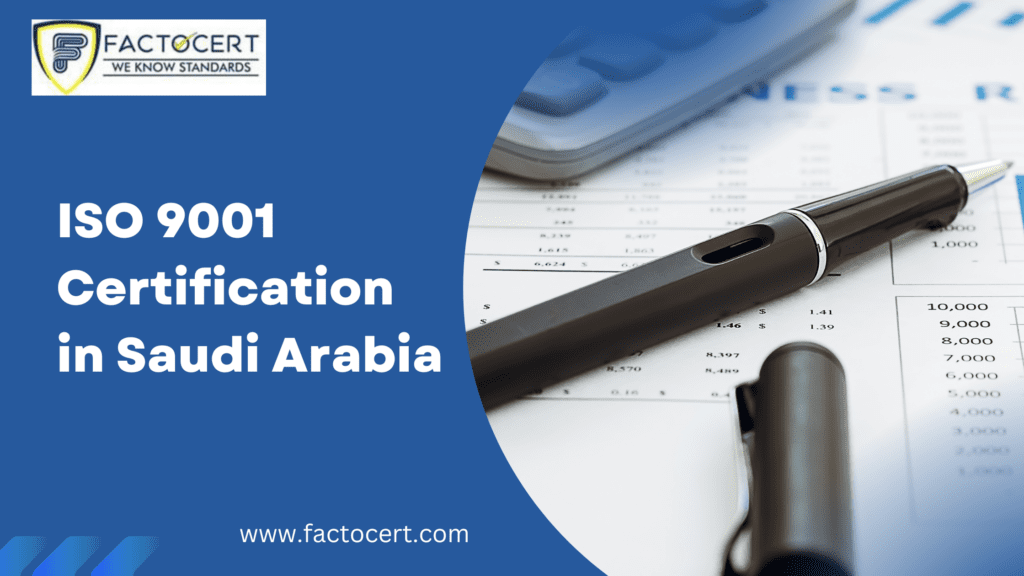ISO 9001 Certification in Saudi Arabia is an excellent investment for Saudi enterprises since it helps to increase quality standards and operational efficiency and gain a competitive advantage. However, firms must evaluate the costs related to attaining ISO 9001 Certification. This article discusses the many costs associated with the ISO 9001 certifying process in Saudi Arabia, such as certifying body fees, internal resource allocation, training charges, documentation, and continuing maintenance.
How much do certification bodies typically charge for ISO 9001 certification in Saudi Arabia?
The fees charged by certifying bodies are among the critical expenditures of ISO 9001 certifying in Saudi Arabia. These charges cover the costs of auditing, examining documents, and issuing certification. The amount varies depending on factors such as the organisation’s size and complexity, the number of employees, and the scope of the certification.
What are Saudi Arabia’s internal resource allocation requirements for ISO 9001 certification?
ISO 9001 certification necessitates internal resources such as specialised employees and time allocation. Employees must be assigned to work on establishing and executing the Quality Management System (QMS), conducting internal audits, and preparing for the external certification audit. Internal resource allocation costs encompass human costs and the opportunity cost of workers’ time spent on certification-related tasks.
What are the training costs for ISO 9001 certification in Saudi Arabia?
Training is essential in the ISO 9001 Certification process. Employees must be trained on the ISO 9001 standard, its standards, and the organisation’s quality management system (QMS). Workshops, seminars, online courses, and specific training for internal auditors may all incur training costs. Investing in staff training ensures that employees thoroughly understand the standard and aids in its efficient implementation.
What are the paperwork costs for the ISO 9001 Certification procedure in Saudi Arabia?
Costs are incurred when developing the necessary documentation for ISO 9001 Certification. As part of their QMS, organisations must develop and maintain policies, procedures, work instructions, and records. Materials, software tools, and external support are all included in documentation costs. Documentation must be well-structured, easily accessible, and compliant with the ISO 9001 standard.
What effect may a gap analysis and consulting have on the prices of ISO 9001 certification in Saudi Arabia?
Organisations frequently undertake a gap analysis before pursuing ISO 9001 Certification to examine their present processes and find areas for improvement. Hiring an ISO 9001 consultant or contracting a third-party consultant incurs significant fees. Consultants provide knowledge in standard implementation, assisting firms through the certification process and guaranteeing ISO 9001 compliance.
What are the continuing maintenance and audit costs for Saudi ISO 9001 certification?
To maintain compliance, ISO 9001 Certification necessitates ongoing maintenance and periodic audits. Internal audits, management reviews, updating documentation, and monitoring the performance of the QMS are all ongoing costs. Regular maintenance ensures the QMS stays relevant, practical, and aligned with the organisations and the developing needs of the ISO 9001 standards.
How does external aid and support affect the expenses of ISO 9001 certification in Saudi Arabia?
Some firms may seek outside assistance to expedite the ISO 9001 Certification process. This could entail hiring outside advisors or enlisting the help of professionals to assist with specific parts of certification. While these services are not free, they can provide essential information, experience and help simplify the certification process.
How much does ISO 9001 Certification in Riyadh cost?
When seeking ISO 9001 Certification in Riyadh, one critical factor to consider is the cost of the certification process. The exact cost of ISO 9001 Certification in Riyadh depends on several factors. These criteria include the organisation’s size and complexity, the scope of the certification, the level of preparation, and the certifying body chosen. Organisations must understand that the cost includes not only certifying body fees, but also expenses such as internal resource allocation, training, paperwork, and continuing maintenance. Fees charged by certification bodies often cover the costs of auditing, examining documents, and issuing certification. These prices can vary depending on the certifying body’s specific needs and services.
How will factocert help you?
Factocert is a prominent provider of ISO 9001 certification in Saudi Arabia. Riyadh, Jeddah, Dammam, Al Khobar, Dhahran, Buraidah, Al-Ahsa, Qatif, Jubail, and other important cities are served by our ISO 9001 Consultants. For additional information, please visit www.factocert.com or email us at contact@factocert.com.
Conclusion:
Obtaining ISO 9001 Certification in Saudi Arabia necessitates a financial investment as well as the allocation of resources. Certification body fees, internal resource allocation, training charges, documentation, gap analysis, continuing maintenance, and external support are all costs of ISO 9001 certification. While the expenditures may vary based on the organisation’s size and complexity, these investments are critical for raising quality standards, improving operational efficiency, and gaining a competitive advantage.
Businesses in Saudi Arabia can efficiently budget for ISO 9001 Certification and ensure a smooth and successful certification process by carefully assessing and budgeting for the associated costs. The long-term benefits of ISO 9001 Certification, such as higher customer satisfaction, market potential, and reputation, outweigh the initial expenditures, making it a worthwhile investment for Saudi enterprises.
For more info visit : ISO 9001 Certification in Saudi Arabia.





